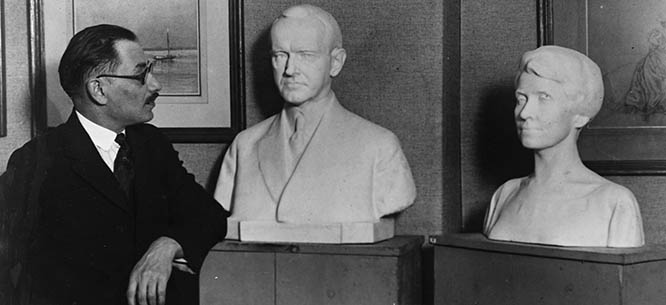Incoherent Heroism
Incoherent Heroism
Trump’s National Garden of American Heroes will be a monument to randomness and a lazy, perhaps unthinking, version of the ideology he is supposed to despise.

Since Donald Trump took office in January, the National Endowment for the Humanities has cancelled thousands of grants, including ones it had already awarded. But its directors plan to spend $34 million of their shrunken budget on a program the president cares quite deeply about: a National Garden of American Heroes. The proposed sculptures of “250 great individuals”—to be completed in time for the 250th anniversary of the Declaration of Independence—reveals what Trump’s minions believe counts as greatness in “our cultural, scientific and political heritage.”
Their grand design, if completed, will be a monument not to historical eminence but to a stunningly incoherent version of the American past. One-term Republican presidents William Howard Taft and Calvin Coolidge make the cut, although neither accomplished much of lasting consequence. But James K. Polk, during whose presidency the United States grabbed a large portion of Mexico, does not. Neither does Woodrow Wilson, whose decision to send 2 million troops to fight in France made the difference in the Allies winning the First World War. But then Wilson was a key architect of the administrative state Trump and Elon Musk are hell bent on destroying.
Ironically, if there is one astonishing thread of meaning that loops through this list of what Trump has called “the greatest Americans to ever live,” it’s DEI.
Consider the evidence: Of the nine athletes included, just three are white (all baseball players). Not one of the athletes is a golfer. The links-loving Trump couldn’t convince his underlings to squeeze Arnold Palmer or Ben Hogan in there? When it comes to Supreme Court justices, Trump’s gardeners want to enshrine Ruth Bader Ginsburg and not Earl Warren—and Thurgood Marshall but not John Marshall (did his creation of judicial review disqualify him?). Sprinkled through the ranks are Native Americans and Hispanics known mainly to historians—like Kateri Tekakwitha (a Mohawk woman who converted to Catholicism and became a saint) and Lorenzo de Zavala (a Mexican governor who helped Texans break away from his mother country).
Christopher Columbus will get his statue too, though. Take that, celebrators of Indigenous Peoples’ Day! Too bad the Genoese explorer, who initiated the genocide of indigenous Americans, died in 1506 and never touched any piece of land that would become the United States nearly three centuries later. He did sail around the Gulf of America, so why quibble?
Few politicians other than presidents get tapped as heroes. Just two members of the House of Representatives who never held a higher office qualify. Political junkies might guess that both would be powerful, long-serving speakers of the House—perhaps Joseph Cannon and Sam Rayburn. But both are female “firsts”: Jeannette Rankin, the first woman elected to the House, and Barbara Jordan, the first Black woman ever elected from a Southern state.
When the prospective stone gardeners chose which American writers to favor, their new zeal for diversity flagged. A septet of nineteenth-century male icons whose books used to be staples on high-school reading lists made the grade: Thoreau, Whitman, Longfellow, Cooper, Melville, Poe, and Twain. Harriet Beecher Stowe and Emily Dickinson should get ready to be bronzed in perpetuity as well. Oddly, though, just one of the nine Americans who won the Nobel Prize for Literature is on the list: that master of understatement, Ernest Hemingway. I had assumed the Trumpers would pass on Toni Morrison, with all her Black characters from the days of slavery and Jim Crow. But perhaps including statues of the Irish Catholic Eugene O’Neill, the white Southerner William Faulkner, and Saul Bellow the Jew would have seemed a cultural surrender to DEI as well.
Naturally, the list includes a healthy share of astronauts and generals, as well as conservative thinkers like Milton Friedman, Russell Kirk, and William F. Buckley Jr. Somehow the ever popular Ayn Rand got left out, perhaps because she detested religion as much as socialism.
The rather small number of entertainers includes one rather peculiar choice. Scrolling down the list from Louis Armstrong and Lauren Bacall to Shirley Temple and John Wayne, there appears just a single performer who made his name on television, the very medium that vaulted Trump to stardom: Alex Trebek, the longtime host of Jeopardy.
What the new sages of the NEH, at the behest of their president, hope to install on the semiquincentennial of our independence will be a monument to randomness and a lazy, perhaps unthinking, version of the ideology they are supposed to despise. Fortunately, the only site proposed for the garden thus far is a piece of private land in the Black Hills of South Dakota, not far from Mount Rushmore, where Donald Trump himself would love to be preserved in granite for all eternity. Final Jeopardy: It represents $34 million of waste, fraud, and abuse. Correct response: What is the National Garden of American Heroes?
Michael Kazin is editor emeritus of Dissent.






